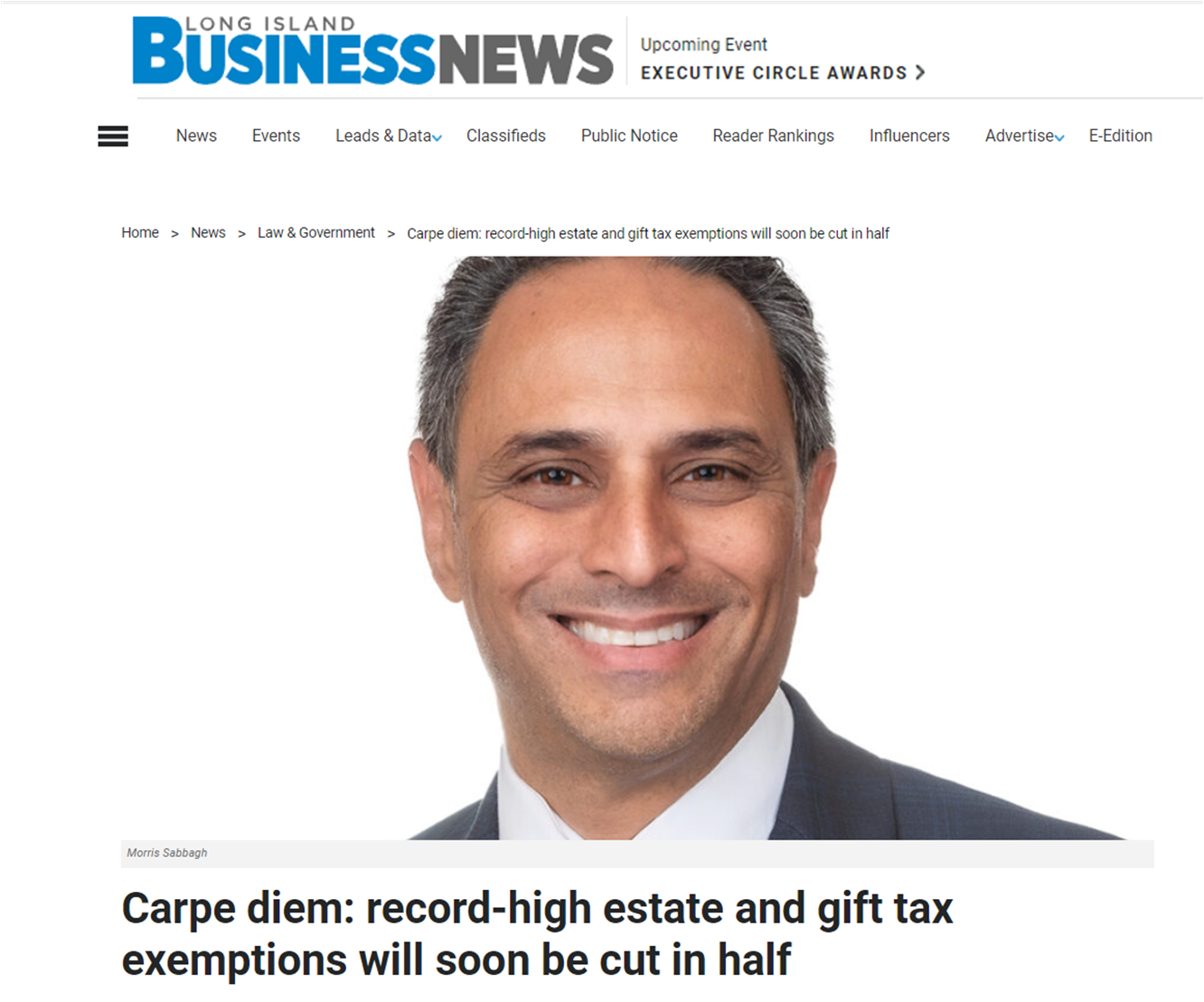VMM partner Morris Sabbagh, a member of the Tax Law, Wills, Trusts, and Estates, Trust and Estate Planning, and Elder Law practices, was invited by Long Island Business News (LIBN) to explain the new IRS estate tax and gift tax exclusions, their upcoming reduction by half in 2026, and what those wishing to take advantage should do.
The article appeared in print on April 4. It can be read here and below.

This year, the IRS raised its estate tax and gift tax exclusions to an unprecedented level, facilitating individuals and married couples to transfer or gift more untaxed money than ever before. But these exclusions are set to be cut roughly in half in 2026, so those wishing to make a bequest or gift, either directly or through a trust, should do so soon.
Current estate and gift tax exclusions
For 2024, the annual gift tax exclusion is $18,000 per recipient (unlimited number of recipients.)
The tax exclusion for gifts to spouses who are not U.S. citizens is $185,000.
The combined gift and estate tax exclusion is $13.61 million per person (including both lifetime gifts made in or prior to 2024 and bequests made by someone who passes away in 2024).
The combined gift and estate tax exclusion for a married couple is $27.22 million. In 2023 it was $25.84 million; if the couple has already maximized use of the 2023 exemption, they can now transfer an additional $1.38 million tax-free.
Upcoming and expected changes
Due to political instability and Congress’ inability to agree on practically anything, estate and gift tax laws have been unpredictable over the past several decades.
Generally, conservatives want a complete repeal of the estate tax, referring to it as a “death tax.” Liberals want to increase it, along with other “wealth taxes,” and to end many of the planning methods used to minimize or eliminate gift, estate and capital gains taxes.
Proposals submitted to Congress in the past few years seek to reduce the per-spouse federal gift and estate tax exemptions to the range of $3.5 million–$7 million, increase estate tax rates, eliminate the basis step-up at death for capital asset, and possibly impose capital gains taxes at death.
While the estate and gift tax exemption can be expected to increase slightly in 2025 due to inflation adjustment, unless Congress takes action by the end of next year—which seems unlikely—the exemption as of Jan. 1, 2026, will be approximately $7 million.
In addition, some of the most aggressive proposals in President Biden’s budget for fiscal year 2025 include:
- Imposing a capital gains tax at the time of a gift or at death for appreciated property value.
- Requiring trusts, partnership, and other non-corporate entities to recognize unrealized gains on appreciated property every 90 years, starting with property held on or after Jan. 1, 1944.
- Modifying the way partial interests in closely-held entities are valued for gift and estate tax purposes.
- Eliminating the use of “Crummey powers” in trusts and placing a $50,000 annual exclusion limit for the person giving the gift, for certain transfers.
- Imposing minimum and maximum terms for Grantor Retained Annuity Trusts.
- Taxing sales between the grantor and a grantor trust.
- Treating a grantor’s payment of income tax for grantor trusts as a gift.
The best time to transfer wealth
Like anything else, questions such as: When is the best time to gift?, In what way?, Under what conditions?, For what purpose? and How much?, are all subjective considerations dependent on your specific goals and circumstances. There’s no “one-size-fits-all” advice.
But if you’re considering transferring wealth, whether through a direct gift, special trust or other vehicle, you should consider doing so in 2024.
The last time the gift and estate tax exemptions were due to sunset was Dec. 31, 2012. After months of debate among lawmakers, Congress finally came to an agreement on Jan. 1, 2013. If that year is any indication, 2025 will be a nail-biter. There is a good chance we will still be in suspense when the ball drops welcoming the New Year in 2026.
The bottom line is this; the time to plan for tomorrow is today.
Morris Sabbagh is a partner in Vishnick McGovern Milizio LLP’s Tax Law; Wills, Trusts, and Estates; Trust and Estate Planning; and Elder Law practices. He focuses on preservation of wealth and administration of estates and trusts, and works with high-net-worth individuals to prevent the dissipation of assets to taxes, creditors and long-term care expenses. He can be reached at msabbagh@vmmlegal.com.



